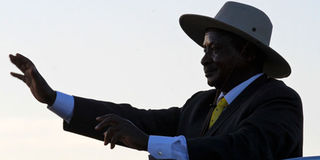How will Museveni leave power?

President Yoweri Museveni. FILE PHOTO
What you need to know:
Question. Can Ugandans remove Museveni through elections organised and presided over by him? It is very unlikely. What then needs to be done?
That Gen Museveni will one day leave power is a foregone conclusion. The question that eludes the finest of Uganda’s political leaders and pundits is when and how he will leave the political stage. It is also very difficult to predict what will happen to Uganda after his departure from the zenith of political power. The latter question is the most significant in my view. It will require real leaders, not mere politicians.
This is because, depending on how he leaves power, Uganda could easily degenerate to the calamitous political instability that has characterised Libya, Iraq or even Syria. In other words, Uganda could effortlessly be thrown into another spate of bloodshed and state of anarchy. To avert that situation, we need to put to work our collective political geniuses and summon our deepest patriotic spirit as a people.
So what is the most likely way through which Gen Museveni will leave power? Like we said before, it is very difficult to foretell how this will happen, because in most of Africa, the indigenous people and political leaders do not necessarily determine their countries’ destinies. Uganda is not an exception to this rule. Consequently, political leaders, especially those in the Opposition, may not have full control on how Mr Museveni eventually leaves power. We can, however, hazard an educated guess.
From the look of things, Gen Museveni is still in the good books of the international community. This is for two reasons. First, they believe that he is still firmly in charge of the state of affairs in Uganda. Therefore, he is their best bet in advancing and protecting their interests here in Uganda and across the Great Lakes’ region. Secondly, the weaknesses and open fissures within Uganda’s political Opposition does not, I presume, in their view, inspire the need for change as yet.
Certainly, for nearly a century now, the West, especially USA, Great Britain and the entire Western Europe have been the main source of violent political change in Africa and the world. In 1971, Uganda became a victim of the West’s underhand plot to oust governments when Gen Idi Amin was used to overthrow president Milton Obote’s government. In the recent past, Libya, Egypt, Iraq, etc., have been victims of these machinations as well.
But the West mainly intervenes in a country’s politics when it is absolutely clear that the balance of power is shifting significantly to a new group, or when their socioeconomic, political and security interests are fundamentally threatened by the regime in power. This, I think, is not yet the case in Uganda.
The international media coverage we see with MP Robert Kyagulanyi, is nothing but media excitement. It has very little to do with the current thinking in Washington, London or Brussels. Certainly, Mr Kyagulanyi, like all other upcoming political leaders, is being profiled and closely monitored by the West.

Robert Mugabe
So, unless Ugandans on their own summon the requisite courage to engage in serious positive political action or civil disobedience, there is a very small chance that Gen Museveni will be removed through mass civil protests. Obviously, there is a very small likelihood that Ugandans will engage in violent armed struggle against Gen Museveni’s regime. This is mainly because there is fatigue with this approach among the people of Uganda. This leaves us with only one viable option; elections.
The question is, therefore, can Ugandans remove Museveni through elections organised and presided over by him? It is very unlikely. What then needs to be done? Change seekers need to unite under one political umbrella and use the campaign period to mobilise Ugandans to actively boycott meaningless elections.
This will deny legitimacy to the regime and create a new dynamic that could pressurise the oligarchs to accept to negotiate a transition arrangement that delivers a win-win political outcome for all the people of Uganda.
But how can those who are seeking for change cobble a workable united front? There is need to stitch together a foolproof decision making process that will be inclusive and respectful of divergence. It is also imperative to put in place an impeccable conflict resolution mechanism that averts and or resolves conflicts behind the scenes.
Finally, there is need to agree concretely on a minimum agenda to be achieved by the political umbrella, but most importantly, the umbrella must openly discuss and agree on an equitable power sharing formulae.




